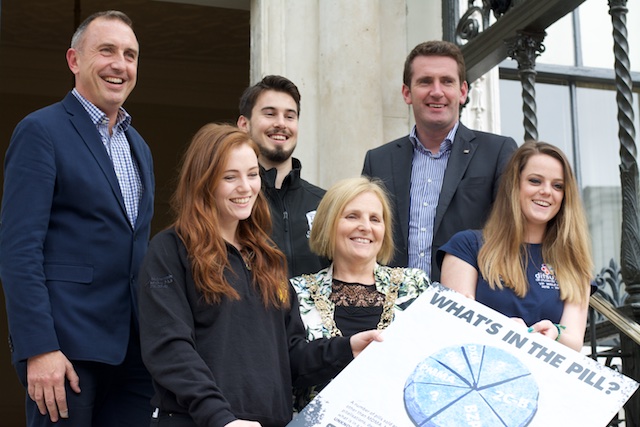Three student unions in conjunction with the Ana Liffey Drug Project and Drugs.ie today launched a campaign which aims to inform students about how they can reduce harm when taking drugs, rather than focusing on discouraging drug use.
Entitled “What’s in the Pill”, the campaign – billed as the first of its kind – will consist of fact sheets and posters which advise students what to do “if you do take a pill”. It is a result of co-ordination between Trinity College Dublin Students’ Union (TCDSU), DIT Students’ Union, and University College Dublin Students’ Union.
A fact sheet released at today’s launch event, attended by the Lord Mayor of Dublin, Críona Ní Dhálaigh, and Aodhán Ó Ríordáin, the junior government minister responsible for the national drugs strategy, advises students that it is “less risky to take half” a pill, not to “double drop”, and not to mix drugs. “Alcohol, other club drugs and prescribed drugs can all interact dangerously with pills, and with each other”, it says.
Speaking at the event, Tony Duffin, the director of the Ana Liffey Drug project, said that the campaign was aiming to be “non-judgemental”. “We don’t judge people for their drug use”, he said, “and this extends into this campaign”. Primarily, he said that it was aiming for “harm-reduction” in providing “solid, evidence-based information” that “is nothing to be afraid of”.
Acknowledging that student drug use is prevalent, he said: “We accept that people will take risks, but we want them to be careful”. He said, however, that all drugs were risky to some degree, and that it was “disingenuous to suggest otherwise”.
Ó Ríordáin also acknowledged the prevalence of drug use, saying that young people “cannot connect” with drug campaigns that encourage students to ‘just say no’ to drugs, because “it’s a lie”. He said that this campaign could “achieve something better”, something that is “rooted in reality”. Ní Dhálaigh echoed this, saying that “just say no” campaigns were “patronising at best”.
While he acknowledged that decriminalisation was not going to be achieved in the lifetime of the current government, he said several times that “you should not be a criminal because you take drugs.”
“I am somebody who will advocate an absolutely drug-free lifestyle”, he said, “but that’s just not where we’re at”.
Speaking to The University Times before the launch of the event, Conor Clancy, the Welfare Officer of TCDSU, said that the aim of the new campaign was to “reach out to students and put power in their hands”. He added that the important thing is that “when drugs are present students will be making a choice and will be aware of the risks”.
The campaign is partly in response to the results of the National Student Drug Survey, which in August revealed that 75 per cent of over 300 Trinity respondents to an online survey said they had used illegal drugs. While the figures were not considered representative of the student population as a whole, they were considered indicative of a high prevalence of drug use.
Speaking at the event, Welfare Officer of UCD Students’ Union, Clare O’Connor, said that after the death of Dublin teenager Ana Hick, who died after allegedly taking ecstasy in May, their union felt they could “no longer dance around the topic of student drug use”.
Dominic McGrath also contributed reporting to this piece.







